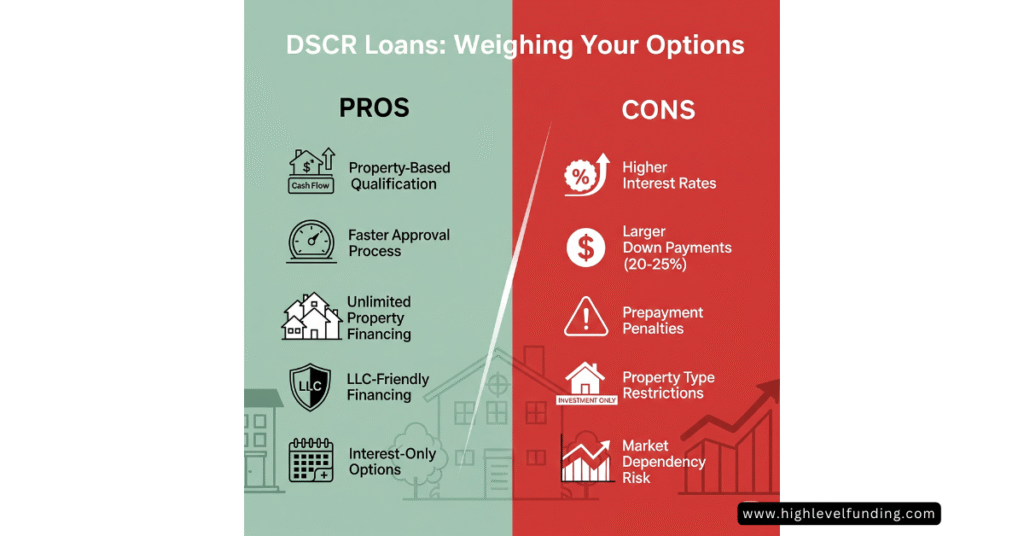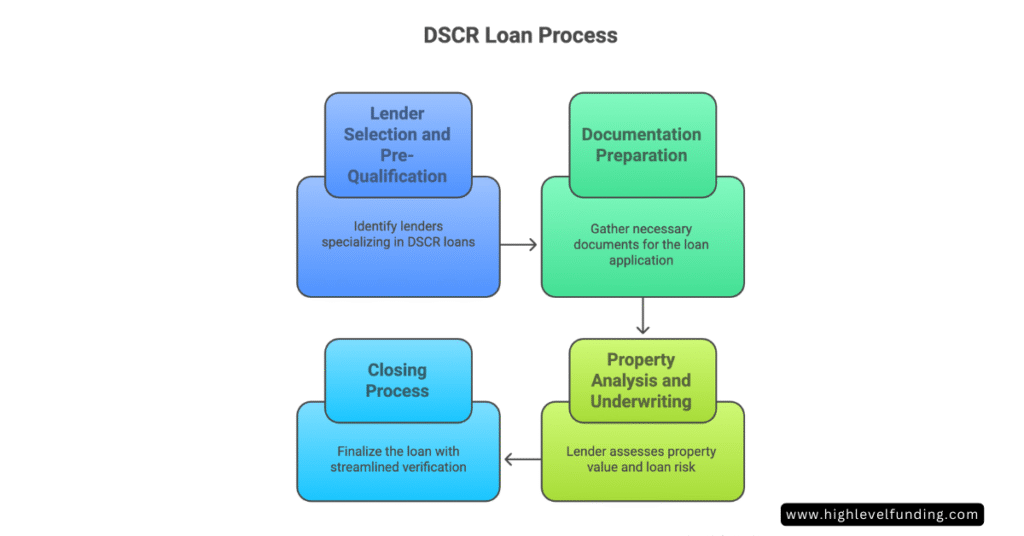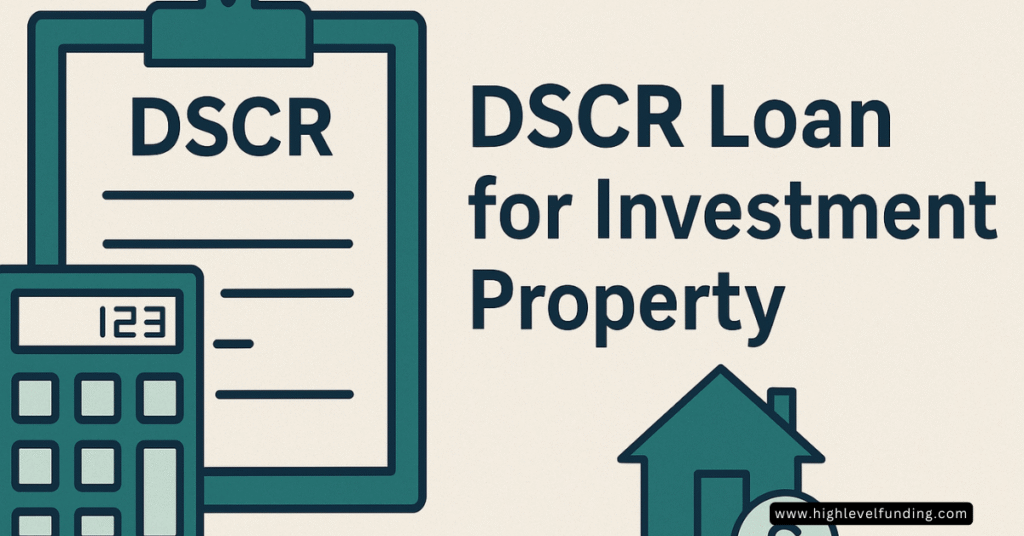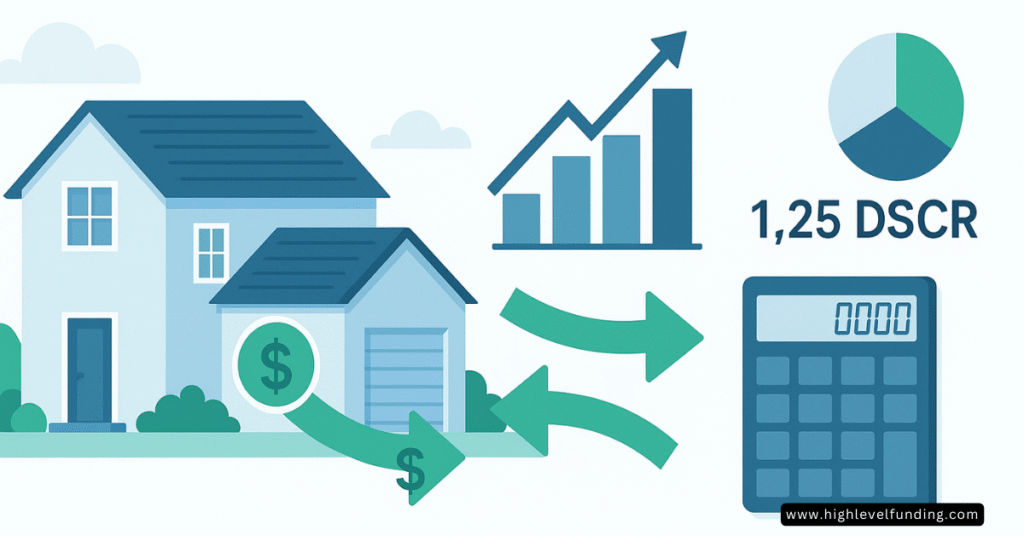Have you ever wondered how successful real estate investors keep expanding their portfolios without hitting the income verification wall that stops most people? The answer lies in a powerful financing tool that’s transforming the investment landscape: the DSCR mortgage loans.
What is a DSCR mortgage loan? A DSCR (Debt Service Coverage Ratio) mortgage loan is a specialized financing option for real estate investors that qualifies borrowers based on a property’s cash flow potential rather than personal income verification. Instead of analyzing your W-2s or tax returns, lenders focus on whether the investment property generates enough rental income to cover its debt obligations.
This comprehensive guide will walk you through everything you need to know about DSCR loans, from the fundamental calculations to strategic applications that could revolutionize your investment approach.
Key Takeaways
- Debt service coverage ratio loans qualify based on property cash flow, not personal income
- Most lenders require a DSCR of 1.2x to 1.25x for approval
- These loans offer faster closing times and unlimited property financing
- Expect higher interest rates and larger down payments compared to conventional mortgages
- Perfect for self-employed investors and portfolio expansion strategies
Understanding the Core: What Makes DSCR Loans Different
Traditional mortgage loans put your personal finances under a microscope. Lenders scrutinize your employment history, debt-to-income ratios, and tax returns to determine if you can repay the loan. DSCR loans flip this approach entirely.
Instead of asking “Can you afford this payment?” DSCR lenders ask “Can this property afford its own payment?” This fundamental shift opens doors for investors who might struggle with conventional financing despite owning profitable rental properties.
The Debt Service Coverage Ratio Explained
The debt service coverage ratio forms the foundation of this loan type. Think of it as a property’s financial report card – it tells lenders whether an investment property generates enough income to comfortably handle its monthly mortgage obligations.
Here’s how real estate investors benefit: if you’re self-employed and your tax returns show minimal income (thanks to depreciation and business write-offs), a DSCR loan evaluates the property’s earning potential instead of your documented personal income.
How to Calculate DSCR: The Essential Formula
The DSCR formula is straightforward: Net Operating Income (NOI) ÷ Total Debt Service
Let me break this down with a practical example:
Net Operating Income (NOI):
- Annual gross rental income: $36,000
- Less operating expenses: $6,000 (property taxes, insurance, maintenance, vacancy allowance)
- NOI = $30,000
Total Debt Service:
- Annual mortgage payment (PITI): $24,000
- HOA fees: $1,200
- Total Debt Service = $25,200
DSCR Calculation: $30,000 ÷ $25,200 = 1.19
This property has a DSCR of 1.19, meaning it generates 19% more income than needed to cover its debt obligations. Most mortgage lenders prefer seeing ratios of 1.2x to 1.25x, so this property would be borderline for many DSCR loan programs.
What Constitutes a Good DSCR Ratio?
- DSCR of 1.0: Property income exactly equals debt payments (break-even)
- DSCR of 1.2-1.25: Minimum requirement for most lenders
- DSCR of 1.5+: Excellent ratio that may qualify for better loan terms
- DSCR below 1.0: Negative cash flow scenario (some specialized programs available)
Pro tip: Many online DSCR calculators can help you quickly evaluate potential investment properties, but understanding the manual calculation helps you make faster decisions when analyzing deals.
| Related: Try Our Free Online DSCR Loan Calculator
The Pros and Cons of DSCR Loans: What Real Estate Investors Need to Know
Advantages of DSCR Mortgage Loans
1. Property-Based Qualification: The biggest advantage? Your personal tax returns don’t dictate your borrowing power. I’ve seen investors with modest documented incomes secure financing for million-dollar properties because the cash flow supported the loan.
2. Faster Approval Process Without extensive income documentation requirements, DSCR loans often close 15-20 days faster than conventional mortgages. In competitive markets, this speed advantage can be the difference between securing your target property or losing it to another investor.
3. Unlimited Property Financing Unlike conventional loans that typically cap investors at 10 financed properties, many DSCR loan programs have no such restrictions. This makes them ideal for aggressive portfolio expansion strategies.
4. LLC-Friendly Financing Most DSCR loan programs allow properties to be purchased in the name of your LLC or corporation, providing liability protection and potential tax benefits.
5. Flexible Loan Terms Many lenders offer interest-only payment options during the initial years, which can significantly improve cash flow for newer investors.

Disadvantages and Risks to Consider
1. Higher Interest Rates DSCR loans typically carry interest rates 0.5% to 1.5% higher than conventional investment property mortgages. This reflects the additional risk lenders assume with non-qualified mortgage products.
2. Larger Down Payment Requirements Expect to put down 20-25% minimum, with many lenders preferring 25-30% for the best terms. This higher capital requirement can limit how quickly you can scale your portfolio.
3. Prepayment Penalties Many DSCR loan programs include prepayment penalties lasting 1-5 years. If you’re planning to refinance quickly, factor these costs into your analysis.
4. Property Type Restrictions DSCR loans work exclusively for rent-ready investment properties. You can’t use them for primary residences, vacation homes, or fixer-uppers that need substantial renovation before generating rental income.
| Related: DSCR Loan for Investment Property: Complete 2025 Guide
DSCR Loan Requirements: How to Get a DSCR Loan
Credit Score Expectations
To qualify for a mortgage, most lenders require minimum credit scores between 620-680, depending on the loan program and your overall profile. Higher credit scores often unlock better interest rates and lower down payment requirements.
Cash Reserve Requirements
Lenders typically require 2-6 months of mortgage payments in cash reserves as a financial cushion. This requirement varies based on your experience level and the property’s DSCR.
Property Appraisal Process
The appraisal process includes both property valuation and rental income verification. Appraisers use comparable rental properties and may complete Form 1007 (Single Family Comparable Rent Schedule) to establish market rent expectations.
Eligible Property Types
- Single-family rental properties
- Condominiums and townhomes
- Small multi-family properties (2-4 units)
- Short-term rental properties (Airbnb/VRBO)
Some lenders extend financing to larger multi-family properties (5+ units), though these often require commercial loan programs.
Strategic Applications: When DSCR Loans Make Perfect Sense
Rapid Portfolio Expansion
If you’re looking to acquire multiple properties quickly, DSCR loans eliminate the income documentation bottleneck that slows conventional financing. I’ve worked with investors who closed on three properties simultaneously using DSCR financing.
Self-Employed Real Estate Investors
Business owners often show minimal personal income on tax returns due to legitimate business deductions. DSCR loans allow these investors to leverage their business success into real estate investments without income documentation hurdles.
Refinancing Existing Investment Properties
DSCR loans work excellently for refinancing existing rental properties, whether you’re seeking better terms or extracting equity for additional investments.
Short-Term Rental Investments
With the growth of Airbnb and VRBO, many DSCR lenders now use short-term rental income projections (often from services like AirDNA) in their qualification calculations.
The DSCR Loan Process: From Application to Closing
1: Lender Selection and Pre-Qualification
Start by identifying lenders who specialize in DSCR loans. Not all mortgage companies offer these programs, so work with brokers or lenders experienced in non-QM lending.
2: Documentation Preparation
While lighter than conventional loans, you’ll still need:
- Purchase agreement or refinance documentation
- Property financial information (existing leases, rent rolls)
- Personal credit and asset documentation
- LLC documentation (if applicable)
3: Property Analysis and Underwriting
The lender orders an appraisal focusing on both property value and rental income potential. Underwriters analyze the DSCR, your credit profile, and overall loan risk.
4: Closing Process
Once approved, closing typically happens faster than conventional loans due to streamlined income verification requirements.

Advanced Strategies: Maximizing DSCR Loan Benefits
Improving Property DSCR
- Increase rental income: Strategic improvements like adding laundry facilities or updating kitchens can justify higher rents
- Reduce operating expenses: Efficient property management and preventive maintenance lower your expense ratios
- Consider interest-only periods: Some DSCR loans offer initial interest-only payments, improving the qualifying ratio
Shopping for Optimal Terms
Don’t accept the first offer. Compare these key factors across multiple lenders:
- Interest rates and APR
- Down payment requirements
- Prepayment penalty terms
- DSCR threshold requirements
- Loan-to-value maximums
Alternatives to DSCR Loans
While DSCR loans offer unique advantages, consider these alternatives:
Conventional Investment Property Mortgages: If you qualify based on personal income, these often offer lower rates despite stricter requirements.
Bank Statement Loans: Another non-QM option for self-employed borrowers using bank deposits to verify income capacity.
Portfolio Lenders: Community banks sometimes offer flexible terms by keeping loans in-house rather than selling to secondary markets.
Hard Money Bridge Financing: Short-term, asset-based loans for quick acquisitions, often refinanced into DSCR loans later.
Common DSCR Loan Mistakes to Avoid
Underestimating Total Costs: Factor in higher interest rates, origination fees, and prepayment penalties when calculating returns.
Ignoring Market Rent Research: Don’t rely solely on current rent. Appraisers use market comparables that might differ from your assumptions.
Overleveraging: Just because you qualify doesn’t mean you should maximize borrowing. Maintain cash flow cushions for market fluctuations.
Is a DSCR Loan Right for Your Investment Strategy?
DSCR loans work best for investors who:
- Generate substantial business income but show low personal income on tax returns
- Want to scale their portfolio rapidly without income documentation delays
- Own properties with strong, verifiable cash flow
- Understand and accept higher financing costs for increased flexibility
These loans may not suit investors who:
- Qualify easily for conventional financing at lower rates
- Prefer minimal down payments
- Plan to refinance quickly (due to prepayment penalties)
- Focus on fix-and-flip strategies requiring renovation financing
Final Thoughts: Leveraging DSCR Loans for Investment Success
What is a DSCR mortgage loan? It’s a powerful financing tool that evaluates investment properties based on their income-generating potential rather than your personal financial documentation. For the right investor and the right property, DSCR loans can unlock opportunities that traditional financing simply can’t match.
The key to success lies in understanding both the opportunities and limitations these loans present. Higher costs and specific requirements mean thorough due diligence is essential, but the flexibility and speed they offer can be game-changing for serious real estate investors.
Before pursuing a DSCR loan, carefully evaluate your investment goals, the property’s financial performance, and your risk tolerance. Consider consulting with an experienced mortgage broker who specializes in investment property financing to ensure you’re making the most informed decision for your unique situation.
Ready to explore DSCR financing for your next investment property? Start by calculating the DSCR on properties you’re considering and connecting with lenders who understand the real estate investment landscape. Your portfolio expansion strategy might be closer than you think.
Frequently Asked Questions
What does DSCR stand for?
DSCR stands for Debt Service Coverage Ratio. It’s a calculation that determines if a property’s income is sufficient to cover its annual mortgage debt obligations.
How do I calculate your DSCR?
Calculate the debt service coverage ratio by dividing the property’s Net Operating Income (NOI) by its Total Debt Service (PITI plus HOA dues). The formula is: DSCR = NOI / Total Debt Service.
What is considered a good DSCR ratio?
Most lenders who offer DSCR loans prefer a ratio of 1.25x or higher. A DSCR above 1.0 indicates positive cash flow, while ratios below 1.0 may still qualify through specialized programs with stricter terms.
Do I need to show personal income for the loan application?
No, this type of mortgage focuses on the property’s income potential rather than your personal income. However, loan officers will still verify your credit score and require cash reserves for loan eligibility.
Can I use DSCR loans for my primary residence?
No, DSCR loans can be used exclusively for investment properties that generate rental income. This type of non-QM loan is designed specifically for real estate investing purposes.
Are DSCR loans more expensive than traditional loans?
Yes, since DSCR loans are often considered higher-risk home loans, they typically carry higher interest rates and fees compared to conventional mortgages due to their specialized nature.
Is there a limit on financed properties?
Many lenders have no restrictions on the number of properties you can finance, making DSCR loans ideal for investors looking to scale their real estate investing portfolio beyond traditional loan limits.
What down payment is required?
Expect minimum loan amounts starting around $100,000 with down payments of 20-25%. The size of the loan and your property’s DSCR will influence final requirements.
Can self-employed investors qualify for the loan?
Yes, DSCR loans are a great option for self-employed individuals since the loan allows real estate investors to qualify without traditional income verification documents.
Do DSCR loans have prepayment penalties?
Many DSCR loan programs include prepayment penalties if you pay off your loan early. Consider whether a DSCR loan is right for your timeline before committing to the duration of the loan.
Can I secure a DSCR loan for short-term rentals?
Yes, many lenders now use DSCR loans for Airbnb properties, using projected income data to assess the property’s ability to repay your mortgage through rental cash flow.
What happens if rental income drops after closing?
While lenders primarily assess DSCR at origination, maintaining adequate cash reserves is crucial. The loan based on property income means you must ensure consistent monthly loan payments regardless of vacancy periods.
What property types are eligible?
DSCR loans are ideal for investors seeking financing on single-family homes, 2-4 unit properties, condos, and townhouses. The property with a DSCR loan must be rent-ready and income-generating.
How quickly can DSCR loans close?
Since DSCR loans focus on the property’s cash flow rather than extensive personal documentation, they often close faster than conventional mortgages, sometimes within 2-3 weeks.
Where can I find DSCR loan lenders?
Various financial institutions offer DSCR loans, including specialized non-QM lenders and mortgage brokers. It’s important to weigh the pros and cons when shopping for the best terms and loan amounts.



